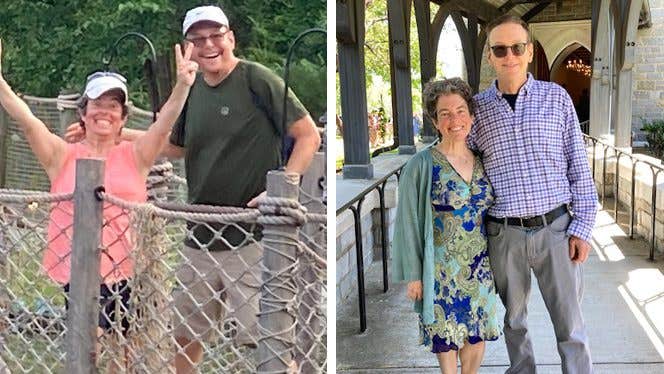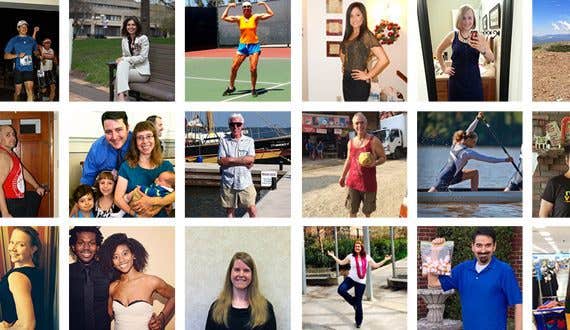
Eating “All Things in Moderation” Ravaged My Athletic Husband’s Arteries
By Rachel Schiera,
In July 2021, we were at mile 700-ish of a 1,000-mile bike trip from Indianapolis, Indiana, to Washington, D.C., staying at a campground in the middle of nowhere, when my husband, Tony, had “the incident.” He woke up in the morning and was just not right. He felt nauseated, and he was visibly puffy. Given his high level of fitness and a recent string of hot days on our bike trip, we thought it was just dehydration. After all, we had done about two weeks of 40- to 70-mile days with our bikes fully loaded with equipment.
Whatever the cause, his symptoms were concerning enough that we made an emergency trip to a little country hospital nearby, where they were able to determine that his symptoms were indicative of cardiac issues. They had him transported to one of the top cardiac centers in the United States. There, the doctors found that Tony had five major arterial blockages and was at risk of a heart attack. He underwent coronary artery bypass surgery within 48 hours of admission.
Questioning Our 'Healthy' Lifestyle
We thought our diet had been decent. “All things in moderation” was our motto. We loved olive oil, steak, butter, cheese, and grilled chicken. We assumed that that diet was working for us both—until Tony’s quintuple bypass. After the surgery our doctor said, "You might look great on the outside, but on the inside you look like a very old man. Your arteries are in terrible shape."
So, as Tony was recovering, I started to ask around at the cardiac center how we could change our lifestyles to support cardiovascular health upon discharge. The most common response I got was to up our activity levels (though a couple staff members laughed as they made this recommendation, saying that we were already fitter than they were).
I asked the cardiologist for dietary recommendations, and he responded that we should eat all things in moderation and follow the American Heart Association guidelines. When I remarked that that is exactly what we had been doing, he said, “Well, you could eat like a monk, but who can keep up that sort of thing? Just make sure that Tony takes the medication that we gave him, and eat however you want.” The cardiologist also made it very clear that we should expect to be back within the year for a stent and within 10 or 20 years for a redo of the bypass.
Stumbling Upon a Solution
I started to read all that I could find about heart-healthy eating and stumbled upon the phrases “carb-forward diet” and “whole-food, plant-based, no-oil.” A librarian recommended the Forks Over Knives books to us.
I decided that we would be eating whole-food, plant-based (WFPB). It felt like a huge leap of faith: No one in our immediate orbit was WFPB, and none of the health professionals we’d spoken to had suggested it. Still, we went all in on WFPB three days after Tony was discharged from the hospital.
The change seemed to work too well, so much so that it was almost frightening. Tony’s energy levels improved daily, and he quickly recovered from the surgery. His blood pressure, which had been borderline high for a couple years, improved each day, until the doctors had to take him off of his blood pressure medications because he was getting hypotensive. Cholesterol levels improved immensely for both of us, and we both began to drop weight easily. My running times steadily improved over the first three weeks until I had shaved two minutes off of my average mile time. Part of this was definitely the weight loss, but I also found that I was breathing easier on my runs.
After three weeks in the city where Tony had had his surgery, we were given the green light to go home. To our surprise, our doctor back home offered exactly what we had been looking for in terms of medical support. She was thrilled that we had made the change to WFPB, and told us that a few of her other patients had done the same and reaped the benefits in terms of their overall health, energy levels, and physical fitness. We were so encouraged to have her support, and we stuck with the new lifestyle. Just three months post-surgery, Tony was down nearly 40 pounds, and I had lost 10.
Loving the WFPB Life
Today we enjoy the same types of dishes that we ate before Tony’s cardiac incident, just with different ingredients. Our cupboard is full of WFPB staples like dates, whole grains, beans, and Grape Nuts, and our freezer and fridge are always stocked with fresh produce. We spent many years working in Asia, so we have made some adjustments to dishes we picked up there. We have found that Korean and Indian recipes are easy to adjust for WFPB. Tony's family is Italian, and much of what is familiar to him is still on the menu, with adjustments. We also got an Almond Cow, which has been a fun addition to our kitchen.
The main challenge we’ve run into is finding WFPB meals while traveling. What we have discovered, though, is that people everywhere we go are curious about this way of eating and will generally go out of their way to try to make something that works for us.
Because this diet so positively impacts health, we bring homemade WFPB food to events and family functions so everyone in our families knows how we are eating and why we are eating this way. Earlier this year, we attended my cousin’s wedding reception and brought our own date cake. Our families were very curious about what we had and wanted to try it. I guess that is what we are finding most often: People always want to try the food we bring, and they always want to know how it tastes so good!
We feel so much better in general. For me, the greatest outcome has been a huge drop in my half marathon time—15 minutes faster, compared with a year ago, and no post-race soreness. To us, this way of eating feels like it is a must.
Ready to get started? Check out Forks Meal Planner, FOK’s easy weekly meal-planning tool to keep you on a healthy plant-based path. To learn more about a whole-food, plant-based diet, visit our Plant-Based Primer.
Has a whole-food, plant-based diet impacted your life?
We would love to hear about it!
SHARE YOUR STORY
Join our mailing list
Get free recipes and the latest info on living a happy, healthy plant-based lifestyle.
By providing your email address, you consent to receive newsletter emails from Forks Over Knives. We value your privacy and will keep your email address safe. You may unsubscribe from our emails at any time.
